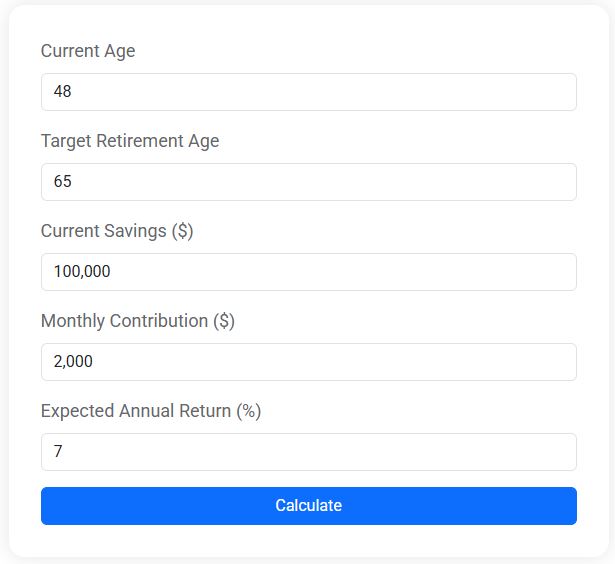Creating a Budget for Your Retirement: Tips and Tricks

Planning for retirement involves estimating future expenses, identifying income sources, adjusting your savings strategy, and planning for longevity. It's crucial to account for potential increases in healthcare costs, discretionary spending, and any large, one-time expenses while also considering the timing of income sources like Social Security benefits. Regularly reviewing and adjusting your budget ensures you maintain financial security and adaptability throughout your retirement years.
Planning for retirement can feel a bit like trying to predict the weather a decade from now. It's a mix of forecasting, educated guessing, and a little bit of crossing your fingers. But just like you wouldn't head out on a long road trip without a map, you shouldn't venture into retirement without a solid budget. Whether you're five years away or already in the thick of it, creating a budget for your retirement is crucial. It’s about ensuring that your golden years are as financially secure and stress-free as possible.
The goal is simple: understand your future expenses, identify income sources, and adjust your savings strategy accordingly. But as with most things in life, the devil is in the details. Let’s dive into some key considerations and strategies that can help you navigate this important financial journey.
Estimating Future Expenses
When planning for retirement, one of the most important steps is estimating your future expenses. Unlike your working years, where you might have a steady paycheck to cover unexpected costs, retirement requires a bit more precision. Start by looking at your current expenses and consider which ones might change after you retire. For example, you might spend less on commuting but more on healthcare or leisure activities.
Healthcare costs, in particular, are notorious for increasing as we age. According to a 2023 report by Fidelity, a couple retiring today could expect to spend over $300,000 on healthcare alone. It's a staggering number, and it's crucial to factor it into your budget. Also, don’t forget to include discretionary spending such as hobbies, travel, or dining out. These are the things that make retirement enjoyable, after all.
You should also prepare for large, one-time expenses. Maybe you’re planning a big family trip, a home renovation, or you’re considering moving to a new location. These costs can add up quickly and should be part of your financial plan. By anticipating these expenses, you can better manage your retirement savings and avoid nasty financial surprises.
Identifying Income Sources
Once you've sketched out your anticipated expenses, it's time to take a hard look at your income sources. Social Security benefits, pensions, retirement accounts, and any part-time work or side gigs are all potential income streams. Understanding when and how much you’ll receive from these sources is key to a successful budget.
Social Security is often a cornerstone of retirement income, but timing is everything. As financial advisor Jane Smith explains, "Delaying Social Security benefits can increase your monthly income significantly, but it's important to balance this with your immediate financial needs." For every year you delay claiming past full retirement age, your benefits increase by about 8%.
In addition to Social Security, consider any pensions or retirement savings accounts. Determine how much you can safely withdraw from these savings to avoid outliving your money. The 4% rule is a popular guideline, suggesting you withdraw 4% of your savings annually. However, with longer life expectancies and changing market conditions, some experts suggest a more conservative approach.
Early Retirement Calculator
Thinking about retiring early? Our free Early Retirement Calculator helps you figure out exactly how much you need to save and invest to reach financial freedom sooner. Whether you're aiming for early retirement at 55, 50, or even 40, this tool gives you a personalized projection based on your current savings, monthly contributions, and expected return on investment. Start planning your path to financial independence today.
Adjusting Your Savings Strategy
With a clear picture of your anticipated expenses and income sources, you can then adjust your savings strategy. If you find your projected expenses outstrip your income, it’s time to ramp up your savings efforts. This might mean increasing your contributions to retirement accounts like a 401(k) or IRA.
Consider also diversifying your investments if you haven’t already. A mix of stocks, bonds, and other assets can provide growth potential while reducing risk. As CNBC notes, "A diversified portfolio can help protect you against market volatility, which is especially important as you near retirement."
It's also wise to build an emergency fund if you haven't yet done so. This fund should cover six months to a year’s worth of expenses, giving you a cushion for unexpected costs without dipping into your long-term savings. Remember, the key here is to adapt and adjust your strategy as you get closer to retirement.
Planning for Longevity
We all hope for a long, healthy life, but living longer also means you'll need more money to sustain yourself. Planning for longevity involves assuming you'll live longer than average and adjusting your budget accordingly. This preparation ensures you won't outlive your savings, which is a common fear among retirees.
One strategy is to plan for at least 20-30 years of retirement. This may seem like a long time, but given advances in healthcare and an increasing life expectancy, it's a prudent approach. Consider purchasing an annuity, which can provide a steady stream of income for life, adding another layer of security to your financial plan.
Moreover, it's wise to regularly review and update your retirement budget. Life is unpredictable, and your financial needs can change. By keeping an eye on your budget and making adjustments as needed, you can better navigate the ups and downs of retirement life.
Reviewing and Adjusting Your Budget
Creating a retirement budget is not a one-and-done deal. It requires regular review and adjustment to ensure it remains relevant to your needs. Schedule an annual check-up for your budget, much like you would for your health. During this review, assess your spending habits, changes in income, and any new expenses that have cropped up.
It's also beneficial to consult with a financial planner during these reviews. An expert can provide insights and suggestions that you might not have considered. They can help you make sense of market changes, tax implications, and new financial products that might be beneficial.
Adjusting your budget doesn't always mean cutting back. Sometimes, you might find you can spend more in certain areas, thanks to a windfall or better-than-expected investment returns. The key is to be flexible and responsive to your financial situation.
Retirement is a significant life transition, but with a well-thought-out budget, you can face your future with confidence. By estimating expenses, identifying income sources, adjusting savings strategies, and planning for longevity, you'll be better prepared for the road ahead. Remember, the best retirement plan is one that's tailored to your unique circumstances and continuously refined as life unfolds.







